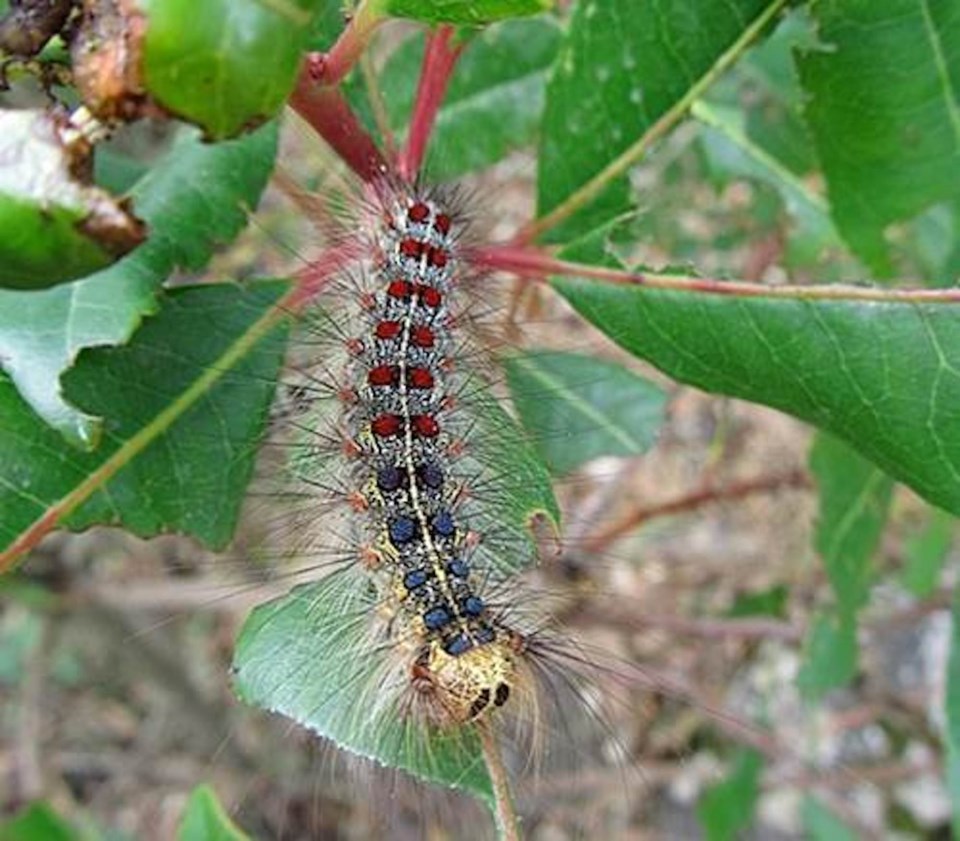It would have been hard to miss seeing the invasive lymantria dispar dispar (LDD) moths, once colloquially known as gypsy moths and now referred to as spongy moths, last year when the caterpillars swarmed city trees.
This spring will be slightly different as the city has surveyed the egg masses and found a 25 per cent reduction in the population, as well as smaller egg masses compared to last year.
“The results determine that the spongy mass will not cause significant harm to our canopy and that the risks to Guelph serviced forests are mild compared to the surrounding communities," said Timea Filer, an urban technologist with the parks and recreation department.
"The population decrease in Guelph is around 25 per cent, and when I say that there were 25 per cent less egg masses when counted in the surveys.”
The LDD cycle occurs every seven to 10 years with these invasive critters staying around for three to five years.
Similar to last year, the City of Guelph will not be aerial spraying chemicals to kill the caterpillars but will again be spraying new tree stock before the trees are planted across the city.
“Last year out of all the survey areas there were only six that were at risk of severe defoliation, so this year that's changed, it’s decreased quite a bit in terms of the egg masses we are seeing,” said Filer. “So, from last year all we did was egg mass scraping in those targeted areas, so while the scraping has a limited effectiveness city-wide it could have reduced the impact in those targeted areas specifically.”
A park walkthrough found the LDD moth population in Guelph’s parks is fairly low and that new egg mass counts are lower than what was reported in the previous survey in January, 2021.
All properties surveyed are forecast to experience nil or light-to-moderate defoliation in 2022. The highest concentration of new egg masses per tree was found in Skov Park, although the forecast for the park was still light-to-moderate.
Aided by mother nature in 2021, the City of Guelph reported a virus that attacks the caterpillars was found in the city towards the later summer months.
“More than anything we did end up observing significant presence of dead caterpillars later in the season as a result of a virus that did impact the caterpillars, so that was significant, and it was that virus along with another fungus that's actually the most significant in reducing those LDD outbreaks and causing the population to collapse," said Filer.
A Feb. 18 letter from Greg Rickford, Minister of Northern Development, Mines, Natural Resources and Forestry said: “Ontario is currently experiencing an outbreak of LDD moth (previously referred to as gypsy moth), particularly in southern Ontario and some areas of the northeast region of the province. Severe LDD moth infestations are cyclical, occurring every seven to 10 years, and usually last three to five years.”
Following last year's infestation, the ministry conducted aerial and ground surveys to map the damaged areas and forecast defoliation for 2022.
The ministry said the data suggest 2022 will be another year with high populations of LDD moth causing moderate to severe defoliation in some areas.
Lighter defoliation is forecasted in some areas that have been impacted in previous years.
The map showed some areas within the Guelph region experienced moderate to severe defoliation.
Before the start of the infestation, putting bands of burlap around trees can give the larvae a place to congregate during warm days and they can be physically removed and killed.
Landowners wishing to reduce impacts on their property can also have trees sprayed with Btk (Bacillus thuringiensis kurstaki) in the spring by a licensed insecticide application company.
This is best carried out by coordinating efforts with other local landowners.
The City of Guelph is expecting to release further information on combating the LDD moths on March 21.
